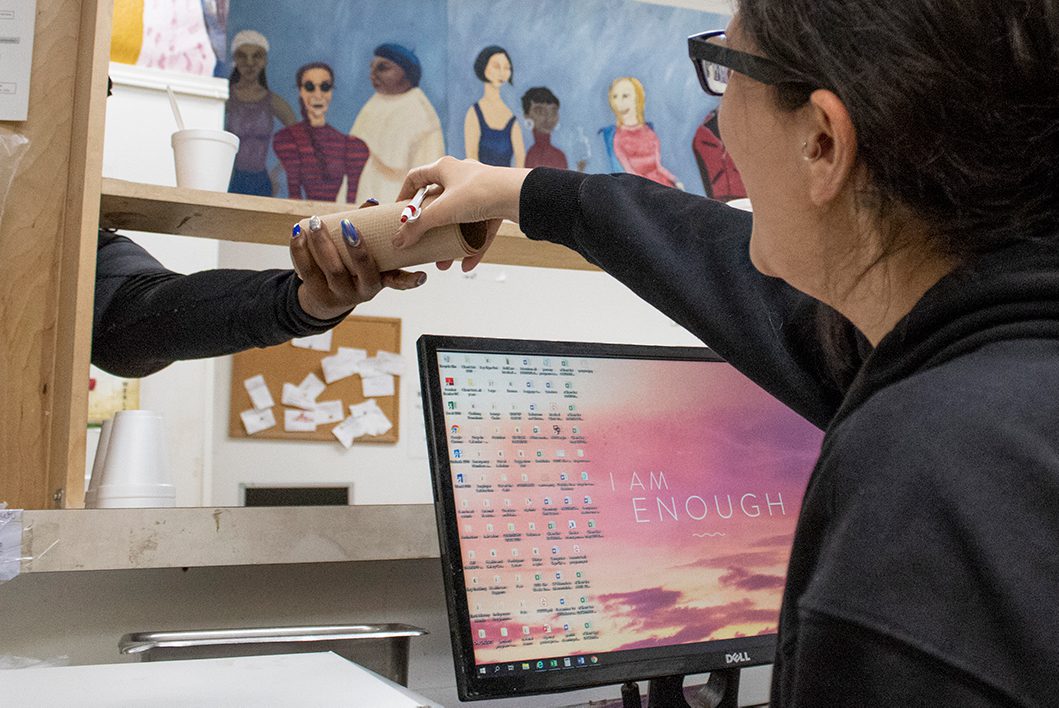On a Saturday at 4 a.m., muted conversations and the occasional shuffle of feet can be heard inside the Sistering drop-in centre as women rest on mats and reclining chairs. Besides a few women settling in for the night, the only people up are Rosa-Lee Mariconda and three other overnight staff members.
“The best part about being awake at 4 a.m. is that it can be really quiet,” says Mariconda, 28, a community support worker who works overnights from Friday to Sunday, 11 p.m. to 8 a.m.
“Some days there’s just not a lot of activity, so the peace of 4 a.m., when it’s there, is beautiful.”
As a low barrier drop-in, Sistering accommodates women from various walks of life, including those who are impoverished, marginalized, and disabled.
Tina Shapiro, 51, a Sistering drop-in coordinator, says the shelter sees up to 90 individual visits per night, but can only sleep 40-60 women.
“(We) maintain the night and try to make sure people are as comfortable as possible, intervene with any conflicts that might arise, try to de-escalate, offer emotional support, and we do a lot of informal counseling,” Mariconda says.
The job isn’t easy and dealing with drop-in users has its challenges, she says.
“(I’ve been) told to ‘Just go kill yourself.’ I’ve been spit at. I’ve had coffee thrown at me. I’ve been physically assaulted,” she says.
The demands of the job require a certain mentality and skill set that don’t come easily, she adds.
(Story continues below)

ELLYSE MCGARR/ TORONTO OBSERVER
“You need to not take things personally … (and) you need to know when to walk away … You need conflict resolution skills, you need de-escalation skills, you need to be trauma informed, and you need to be comfortable with harm reduction strategies”
–Rosa-Lee Mariconda
“You need to not take things personally … (and) you need to know when to walk away,” says Mariconda. “You need conflict resolution skills, you need de-escalation skills, you need to be trauma informed, and you need to be comfortable with harm reduction strategies.”
According to Shapiro, staff members are given ongoing training to prepare them for difficult situations, such as self-defense training, Understanding and Managing Aggressive Behaviour (UMAB) and most recently, the Excellence through Quality Improvement Project (EQIP).
“We’re working on reducing violence in the drop-in,” she says.
Although challenging, the job also sees lighter moments that are part of what makes the work worthwhile.
“It’s nice leaving and people are like, ‘See you later!’ or they’ll ask ‘When are you in next?’” says Mariconda. “It’s also rewarding if someone thanks you for something you’ve done.”
She says that despite Sistering’s strength as a low-barrier shelter, it could still benefit from continued investment in order to provide programming for participants.
“We need things to offer them. Being able to offer our participants (outings and activities allows them) to be involved in something that everybody else is involved in,” she says. “Everybody else goes on hikes. Everybody else goes on camping trips. Everybody has dance party nights.”
Mariconda says ensuring that Sistering is an equal-opportunity environment is a top priority.
Check out more Toronto at 4 a.m. content here!
Online: Torontoobserver.ca/toronto-at-4-am
Instagram: @6ix_at_4
Twitter: @6ix_at_4
Facebook: Torontoat4am

